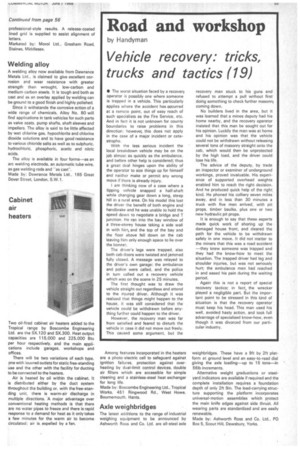Road and workshop
Page 61

If you've noticed an error in this article please click here to report it so we can fix it.
by Handyman
Vehicle recovery: tricks, trucks and tactics (19)
• The worst situation faced by a recovery operator is possibly one where someone is trapped in a vehicle. This particularly applies where the accident has occurred at a remote point, out of easy reach of such specialists as the Fire Service, etc. And in fact it is not unknown for county boundaries to raise problems in this direction: however, this does not apply in the case of a major incident or catastrophe.
With the less serious incident the local breakdown vehicle may be on the job almost as quickly as the ambulance, and before other help is considered; thus a great deal hinges upon the ability of the operator to size things up for himself and neither make or permit any wrong move if there is already injury.
I am thinking now of a case where a tipping vehicle snapped a half-shaft while changing gear down a long, steep hill in a rural area. On his model this lost the driver the benefit of both engine and handbrake and he was unable to hold the speed down to negotiate a bridge and T junction. He ran into the bay window of a three-storey house taking a side wall in with him, and the top of the bay and the floor above fell down on the cab leaving him only enough space to lie over the bonnet.
The driver's legs were trapped, also both cab doors were twisted and jammed fully closed. A message was relayed to the driver's own garage: the ambulance and police were called, and the police in turn called out a recovery vehicle which was on the scene in 25 minutes.
The first thought was to draw the vehicle straight out regardless and attend to the injured driver. Although it was realized that things might happen to the house, it was still considered that the vehicle could be withdrawn before anything further could happen to the driver.
However, the recovery man was far from satisfied and feared to disturb the vehicle in case it did not move out freely. This caused some argument, but the recovery man stuck to his guns and refused to attempt a pull without first doing something to check further masonry coming down.
No builders lived in the area, but it was learned that a mines deputy had his home nearby, and the recovery operator insisted that this man be sought out for his opinion. Luckily the man was at home and his opinion was that the vehicle could not be withdrawn without releasing several tons of masonry straight onto the cab, which would then be unprotected by the high load, and the driver could lose his life.
The advice of the deputy, by trade an inspector or examiner of underground workings, proved invaluable. His experience of supported overhead weights enabled him to reach the right decision. And he produced quick help of the right. kind. He phoned his colliery seven miles away, and in less than 30 minutes a truck with five men arrived, with pit props, timber baulks, plus one or two new hydraulic pit props.
It is enough to say that these experts made quick work of shoring up' the damaged house front, and cleared the path for the vehicle to be withdrawn safely in one move. It did not matter to the miners that this was a road accident —they knew someone was trapped and they had the know-how to meet the situation. The trapped driver had leg and shoulder injuries, but was not seriously hurt; the ambulance men had reached in and eased his pain during the waiting period.
Again this is not a report of special recovery tactics; in fact, the wrecker played a negligible part. But the important point to be stressed in this kind of situation is that the recovery operator must keep his head. This man used his well, avoided hasty action, and took full advantage of specialized know-how, even though it was divorced from our particular industry.
















































































































































